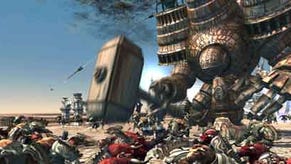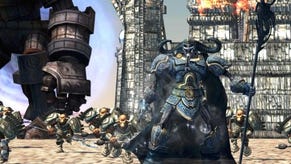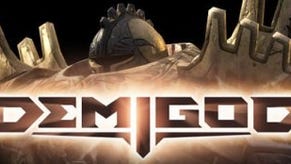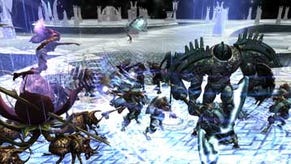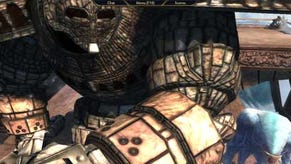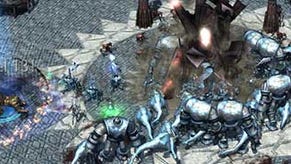Divinely Disconnected: Demigod Unreviewed
What follows can't really be said to be a review. The plan was that I would write up a "Wot I Think" discussion of Demigod for the week it was released, but that didn't work out. Having suffered quite a bit of upset on launch, Demigod - which has been heavily patched and continues to evolve - remains troubled. The trouble is nothing to do with game design, it's to do with the internet. A technical issue. I've only been able to connect to a single online game in countless hours of trying, troubleshooting, tweaking, crying. Alec seems similarly blighted. What follows is therefore is the incomplete account of an unhappy soul. But it should also be clear that I think this - in spite of it all - a brilliant game.
From the chiming harp noises of the menu screen to the writhing death-throes of the demigods themselves, Demigod is beautiful. And I don't mean that lightly: this is one of the most exquisitely presented games I've encountered. I'm sure it won't meet all tastes, but its mix of madness, monstrousness and meticulously detail is somehow exactly what I wanted.
The "gameness" of it is at the forefront: it's a battle between supernatural beings for the throne of a god: the fiction instantly explains away game logic. It's a battle on a celestial board. It might be filled with wraiths, giants and other shambling horrors, but it feels as pure as chess.
It is, of course, rather more complex than chess, despite you only having one piece to play with: the demigod. Each arena has two citadels, one light and one dark. The demigods of either side (arenas run up to 5v5) must defend their own citadel and destroy that of the opposing side. The citadels are heavily entrenched, with energy-blasting towers, archer towers, and fortresses (occasionally upgraded with trebuchets) defending the citadel. It's a strategy game where the turtling has already happened.
Across the map are a series of flags. These represent strategic points and may come with an artifact shop or money making gold-making cog thing attached. They might also be attached to a portal. Portals are at the heart of the battle: from them waves of your forces pour through into the world. On meeting enemy forces, or enemy defences, they begin to attack. As your war-rank increases - through domination of the flags - so your citadel can be upgraded to unleash tougher and more impressive monsters from the portals: angels, dinosaur-trebuchets, giants. The battles can be quite frenzied, with hundreds of causalities on either side. And in the midst of it all are the demigods.
There are eight demigods. Four are assassins, and these are the great fighters and damage dealers. Four are generals, and their powers are in augmenting the efforts of the combatants around them. As the game progresses the demigods rely on two resources to increase their personal power: gold, which allows them to upgrade the citadel, or to purchase items for themselves. And experience. Capturing flags and killing opponents means that you level up, and these open up the trees of skill progression. Choosing your favourite build (ideal for the hours of offline experimentation I've been condemned to) is where the greatest pleasure lies in Demigod. Working out how a demigod can be made most brutally effective is a game in itself. (And, it's worth noting, the game insists on such experimentation and exploration - it doesn't have any kind of tutorial. This hasn't been as much of a problem as it might seem.)
Torch Bearer is probably the demigod that most people gravitate towards, not least because he's top left of the menu. He's a damage-deal extraordinaire, with a battery of ice and fire powers with personalities to match. Shrill and exuberant with fire, earth-bound and tenebrous with ice. Like all the demigod's he has a major weakness than needs to be patched up with purchased items - armour, potions, scrolls, powerful bound artifacts. Torch Bearer needs a bit of a hit point buff. And then he's ready. Floating into a battle and circling everyone in flame, before blasting an opposing god with your fireball: it's scintillating stuff. I got to grips Torch Bearer quickest of all, and I expect I'll return to him. The flames are good.
Regulus, the crossbow-equipped angel, is another relatively weak character. But his ranged attack is deadly in world of melee. He's able to do huge damage to both other demigods and the defensive towers. There's something about his smarmy face, and the fact that the AI regular uses him effectively, which means he's my least-played demigod aside from Sedna, but he's clearly a unique role on the field. I'll have to experiment with him some more.
Unclean Beast is, apparently, rather popular online. The diseased mega-dog must tap directly into the psyche of gamers, and perhaps that's why he was the first demigod I used extensively. Something about being fast, but also being a strong melee character must be appealing. Or perhaps it's the stinky ooze, it's hard to tell. Unclean Beast, however, is savagely powerful on the field of battle: the damage-over-time infections in his attacks are particularly useful when fight a battle on a number of fronts, and I suspect it's the all round most powerful melee character. When you just want to put down a lot of damage, he is the way to do it.
The fourth assassin is the iconic walking castle, The Rook. This stone-voiced behemoth is both a builder and a destroyer: awesome against enemy structures, and also able to put down his own, depending on how you choose to develop him as the game progresses. I've found him peculiarly vulnerable unless he's equipped with teleportation items, which allow him (or any god that is able to purchase them) to zip back to base and buff up before heading back into the fray. The giant is quite clearly the most visually impressive of the demigods, and I feel as if Gas Powered missed a trick by not giving him a similarly immense foil among the generals.
The one point where a tutorial might have come in handy would have been in explaining the generals. The first of these, The Oak, I first played without assigning him any additional units whatsoever. He was able to summon wraiths from the copses of his enemies, and I assumed that was his lot. Not so, however, as generals are also able to summon extra creatures with items that only they can buy. There's something brave about the Oak - his shield state makes him extremely tough, and his general metallic solidity makes you feel confident about sending him into a horrendous melee brawl. As my favourite character I've spent a long time playing with him, and he feeds into my defensive, turtling urge: everything I can sinks into buffing him up. More healing potions, more hit-point boosting items, more armour.
The Queen of Thorns - who is woman stamen of a giant writing flower carried on the back of four beetles - is the most bizarre and inspired of the demigod design. She plays in quite an esoteric manner too, with powerful area-of-effect attacks, and shambling monsters which defend her. As with a number of the other gods she can take on different states, giving her access to different powers. She can only summon her shambler minions, for example, when she is cocooned inside the closed flower. Perhaps it's the sheer weirdness of her, but I hate finding the Queen as an opponent on my field, but also feel uncomfortable playing her. She feels treacherous and unwieldy.
Sedna - a woman riding a sabre-tooth cat - is, as I understand her, the classic healer. She provides huge buffs to minions and demigods alike. She also "silences" other gods, stopping them from deploying various abilities. She's by far the least interesting design in the game, and therefore the character I've spent the least time with.
Finally, Lord Erebus. The floating vampire lord is far the campest of the demigods, but his no less entertaining to play for all that. Buffing him up as an offensive character means you can suck the life out of your opponents in seconds, while making Erebus stronger. He's good with the minions too, having a bunch of "nightstalker" creatures raised from fallen combatants accompanying him. Playing as Erebus is perhaps the most "general" like of the general players. You do lord over minions, choosing your moment to strike at enemies, aiding your allies as you send in your minions to drag a demigod to his death. Splendid, classic, stuff.
When these gods collide among the hordes of their followers, their abilities going off like fireworks, things really are spectacular. And as engaging as it is to play, so entrancing it is to watch. The game plays well, and looks better. There are some design problems aside from the obvious, larger issues: the UI could be clearer and display more information, the tutorial could exist, the back and forth of the large maps could be less taxing, and mid game could be less about tower-dropping attrition. And yet, I enjoy it enormously. Demigod's gods are interesting things to play with inside a tactical context that really engages me. There's no pretense about the gaminess of it and, and when the booming voiceover dude channels Christopher Lee to announce a "double smite" it feels okay: especially as it somehow reminds me more of Clash of The Titans than Unreal Tournament.
And I want to take all this online, to crush my enemies and burn their minions. And cackle. Always the cackle. Alas.
So what about you, readers? How have your excursions into the realm of Demigod treated you? And your favourite demigod?








